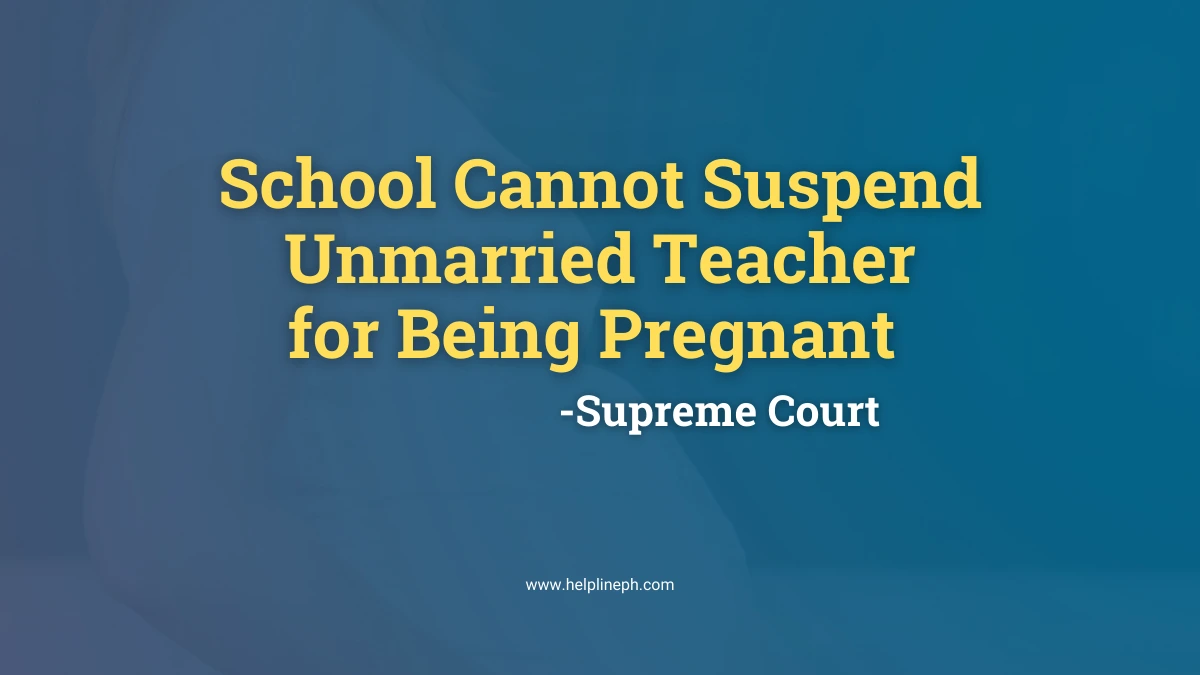The Case of Miraflor Mabao
The Supreme Court of the Philippines recently ruled that a teacher cannot be suspended for becoming pregnant outside of marriage. In a decision written by Associate Justice Ricardo R. Rosario, the Court declared that premarital pregnancy is not immoral and does not justify suspension.
This ruling stems from the case of Miraflor Mabao, a grade school teacher at Bohol Wisdom School (BWS), a Christian school. When Mabao was two months pregnant, the school principal, Raul Deloso, verbally suspended her. He told her she would remain suspended until she married the father of her child.
Five days later, the school gave Mabao an official notice, stating she was suspended indefinitely and without pay for “immorality” unless she married her boyfriend.
What the Supreme Court Decided
The Supreme Court found BWS’s actions illegal. It ruled that sexual relations between two unmarried, consenting adults are not immoral under Philippine law. The Court emphasized that:
- No law prohibits premarital relationships or pregnancies.
- Morality should be based on public and secular standards, not religious beliefs.
The Court clarified that public morality refers to actions that harm society, while religious morality is based on specific beliefs. For policies to be fair and inclusive, public morality must guide decisions, not religious rules.
Why the Suspension Was Wrong
The Supreme Court held that suspending Mabao for her pregnancy violated her rights. The school’s actions were discriminatory and unfair. The Court explained that applying religious beliefs to workplace rules would force employees to follow a particular religion, which goes against the Constitution.
Mabao’s pregnancy did not harm society or violate any law. Therefore, it could not be used as a reason to suspend her.
Back Pay and Benefits Ordered
As part of its decision, the Supreme Court ordered BWS to compensate Mabao. The school must pay her back wages and other benefits for the entire period she was suspended.
What This Decision Means
This ruling sends a strong message about fairness and equality in the workplace:
- Employers cannot suspend or punish workers for personal matters that are not illegal or harmful to others.
- The law respects the rights of individuals to make personal choices, including relationships and pregnancy, without fear of workplace discrimination.
By emphasizing public and secular standards, the Court reaffirmed the importance of separating religion from workplace policies and government decisions.
Frequently Asked Questions (FAQs)
Can schools suspend employees for personal choices like pregnancy?
No. The Supreme Court ruled that personal choices, such as becoming pregnant outside marriage, are not valid reasons for suspension, especially if they are not harmful or illegal.
Does this decision apply only to Christian schools?
No. This ruling applies to all workplaces, regardless of religious affiliation. Employers must follow public and secular standards of morality, not religious rules.
What does “public and secular morality” mean?
Public and secular morality refers to actions that are harmful to society as a whole. It is different from religious morality, which is based on specific religious beliefs.
What happens if an employer ignores this ruling?
If an employer suspends or discriminates against an employee for reasons similar to this case, the employee can file a complaint for illegal suspension or constructive dismissal. The court may order the employer to pay damages.
Why did the Supreme Court make this decision?
The Court made this decision to protect individual rights and ensure fairness in the workplace. It aims to prevent discrimination based on personal choices that do not harm society or violate the law.






